Finding the perfect temperature for an outdoor pool can sometimes be challenging. Are you wondering what the outdoor air temp and pool temperatures have in common and how they affect each other and your ability to swim? Well, we have plenty of great information regarding this below! Let's dive in:
Generally, you want to keep an outdoor pool between 78 and 82 degrees Fahrenheit throughout the year. Especially if the outdoor air is colder than 70 degrees, having a pool in the mid-high 60s won't usually cut it.
Again, this depends on your cold tolerance, but for the most part, an outdoor pool won't be comfortable to swim in if it's under 70 degrees.
As we start this post, we will cover all things outdoor swimming pools and discuss how warm one should be if you want to swim. Whether you're in the tropics, somewhere with harsh winters, or have other related pool questions, we're here to help. With that said, let's dive right into this topic!
What Temperature Should I Keep My Outdoor Pool?
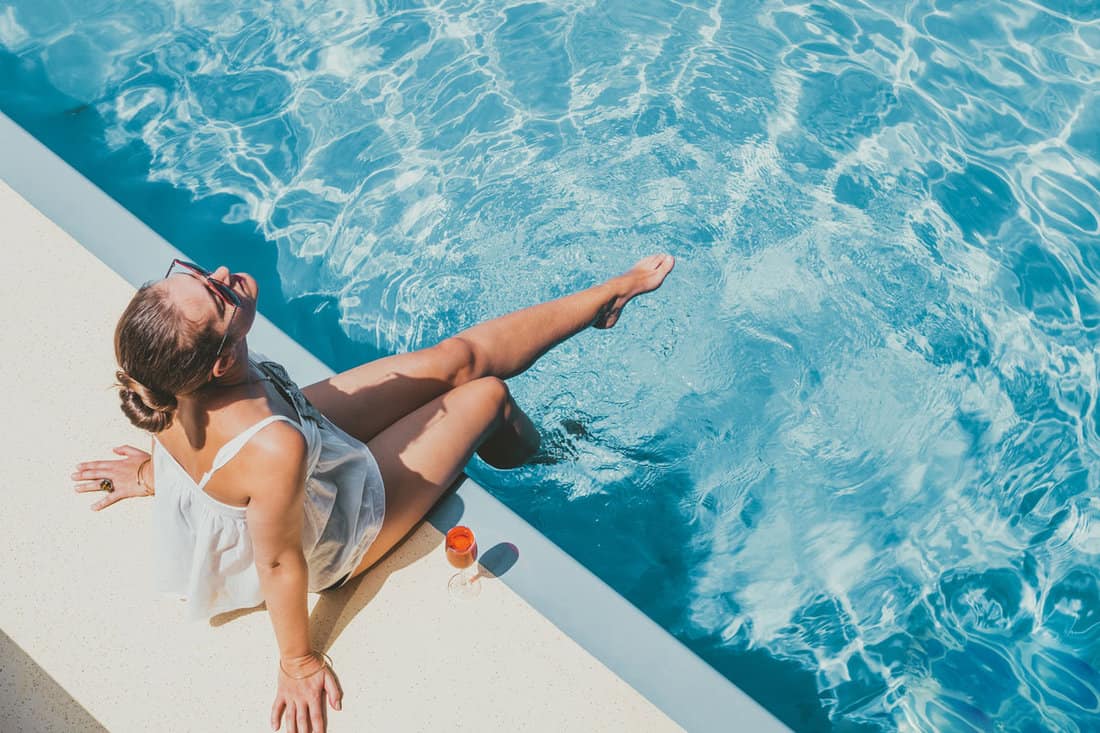
The ideal temperature range for an outdoor pool is between 77 or 78 and 82 degrees Fahrenheit. We say 77 or 78 as a starting climate because some people require that additional degree for swimming.
It's also worth noting that keeping your outdoor pool at this temperature will prevent bacteria from growing inside it, which is essential for your safety.
Generally, you don't want an outdoor pool to be too warm. Even though swimming in a tub-like temperature can feel relaxing, from a safety standpoint, it's not worth it.
On the other hand, you also want to figure out what temperature you can handle while swimming. If you're sensitive to lower climates, having your pool closer to 80 degrees may be best.
In contrast, if you can't stand warm water while you swim, we recommend staying closer to that 77-degree minimum. Everyone is different, so no two pools are the same.
What's The Best Outdoor Pool Temperature For Swimming?
If you use your pool for swimming, it needs to be in a specific temperature range. According to the World Health Organization, an outdoor and indoor swimming pool needs to be between 78 to 86 degrees Fahrenheit.
Of course, this is their recommendation for those planning a strenuous swim session, as your body will work much harder than a regular dip.
Furthermore, you want to ensure your pool is comfortable to stand in before swimming. If you feel your pool is too cold, swimming through that feeling can cause you to go into shock.
The same thing can occur with super warm water, not including the potential bacteria that could be lingering. As we mentioned, your pool shouldn't be much higher than 82 degrees Fahrenheit for bacteria purposes.
So, although the WHO is credible and reliable, we recommend keeping your pool's water around 82-84 degrees maximum.
Especially if you're somewhere hot already, having the water in your swimming pool be 86 degrees can mean it's closer to 88 or 90 on a sweltering day.
How Does Outdoor Air Temperature Affect A Pool?
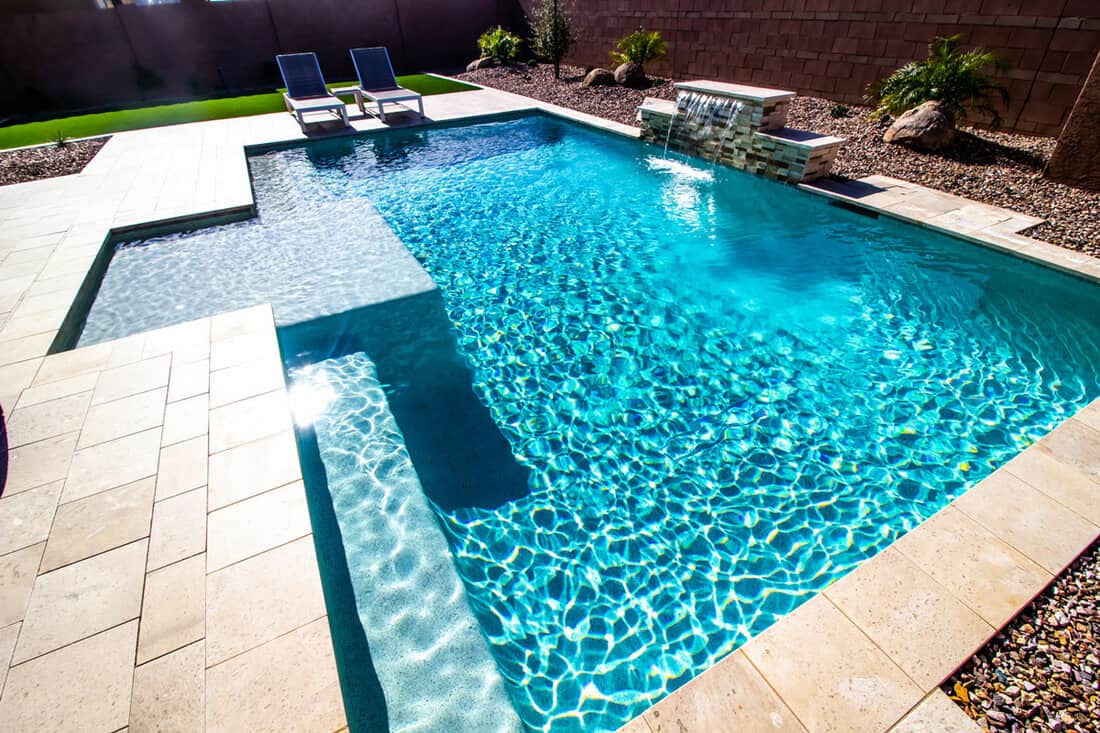
We sometimes add affiliate links and content that was curated and created by our team with the help of advanced ai tools to help showcase the best design styles.
Although we don't consider the outdoor air affecting the pool too greatly, this can be significant depending on the weather.
Generally, a good rule to follow is to keep your pool two degrees below the outdoor temperature but not above 86 degrees Fahrenheit.
As we shared above, 82 degrees is a safe water climate for you, as bacteria won't be able to grow. Since bacteria thrive in warm, wet conditions, your outdoor pool can quickly become a breeding ground if it becomes super hot.
Therefore, having a maximum set water temperature of 82 degrees allows for leeway during the heat of the day, when the air temperatures could be 90+ degrees.
Many experts stress the importance of following these guidelines, as the air temperature can dramatically impact the safety of an outdoor swimming pool.
What Affects The Temperature Of A Swimming Pool?
When it comes to "what" affects the temperature of a swimming pool, this comes down to a few major factors. Generally, air temperature and ground temperature are the most significant players here.
In addition, the humidity outside can also affect how your pool reacts throughout the day. Chemical balances will also fit into this equation, although that is more for your safety than the climate of your structure.
Unlike an indoor pool, you can't always control the external conditions. For example, if it hits 100 degrees during the day in the summertime, your pool's water will likely become much warmer than you have it set.
Even with high-tech water temperature systems in place, the outdoor air temperature can take control of your pool during extremely hot (or cold) periods.
That's why we recommend setting your pool to a lower temperature, like 77-82 degrees, as this allows for more leeway before your pool becomes unsafe to swim in.
How Warm Should I Keep My Outdoor Pool In The Winter?
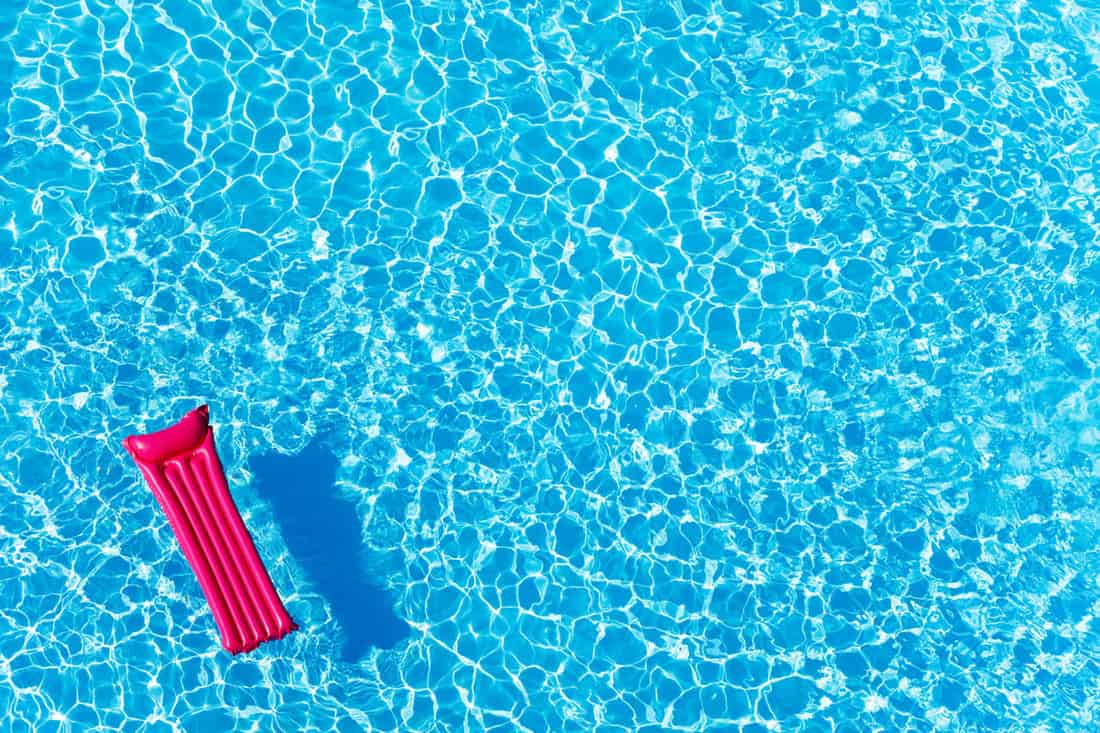
If you live somewhere with harsh winter conditions, maintaining a warm pool can be impossible. Besides costing an arm and a leg, not every outdoor pool will be swimmable all year.
However, some experts recommend using solar heating systems for wintertime heating, as this won't be as expensive as a traditional system.
Therefore, we recommend trying that and keeping your pool at least 75 degrees if you want to use it. Again, you can always keep your pool at 70 degrees when you aren't swimming and then turn up the heat a day or two before you dive in, so there are many ways to do this.
How many people want to swim if the air temperature is under 50 or 60 degrees? As we said, heat can turn a pool hot, and in this situation, the colder climate can do the same thing to a warm body of water.
Will My Pool Freeze In The Winter?
Although this won't happen if you keep your pool heater turned on, a pool can become frozen in severe weather. For example, if you let a pool sit stagnant without heat and the water reaches below zero, expect it to freeze.
Again, keeping the water heated at 40-50 degrees through the winter will prevent this from happening. According to Rising Sun Pools, if your pool's water hits zero degrees and continues to be at that climate, the water can freeze at a rate of ¼" per day.
On top of that, a frozen pool can cause damage to its structural integrity. Many experts warn that freezing water can wreak havoc on your pumps and even burst your pipes.
Not only will that mean expensive repairs in the spring, but it also means you can't swim until everything is repaired. So, keep your system running (even at lower temperatures) through winter.
How Does A Pool Heating System Work?
Understanding how your pool heater works is essential. Simply put, your system will run heat through a set of coils, which then pass through the compressor.
From there, your system's compressor increases the air's heat, moving the hot gas into your pool's water. The cold water from your pool circulates through the heater, being pushed out at a higher climate into the main body of water.
So, if your pool's water is currently 65 degrees and you need it warmer, you'd want to set the thermostat on your heating system to around 70-75 and go up from there.
Again, this will take time, so don't try and heat a freezing pool the day you want to use it.
According to AquaCal, a heat pump can take anywhere from 24 to 72 hours to warm the water in your pool properly, so we recommend preparing a couple of days ahead.
How Much Does It Cost Per Month To Heat A Swimming Pool?
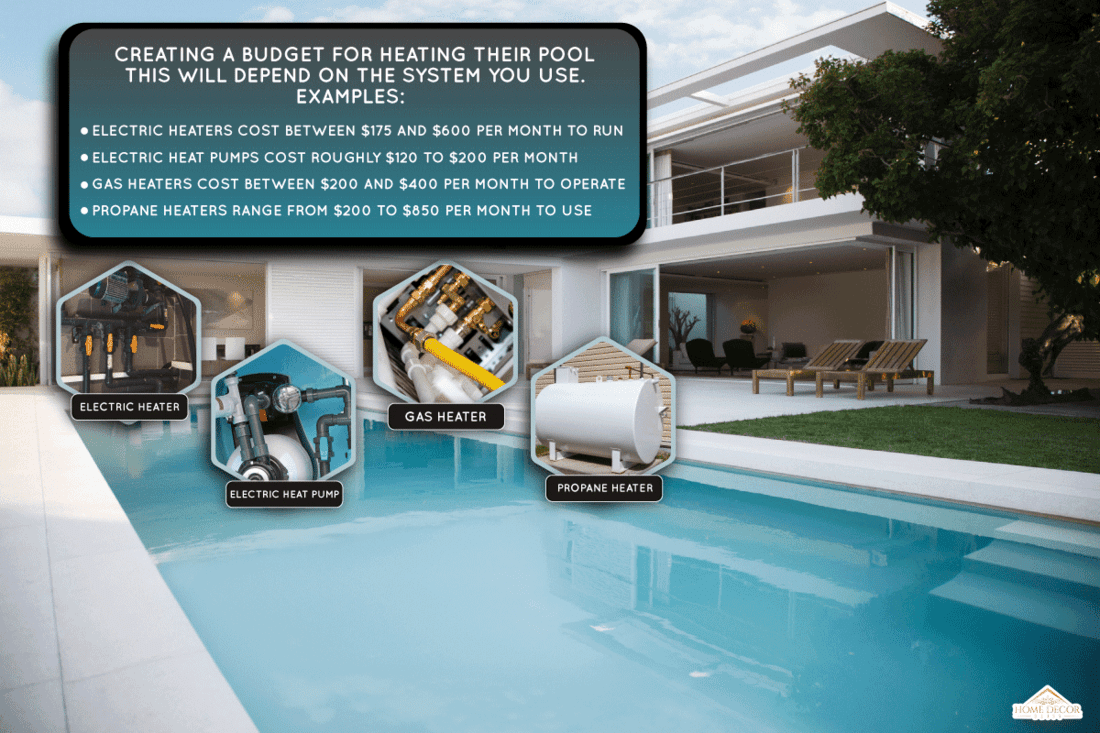
For those trying to create a budget for heating their pool, this will greatly vary depending on the type of system you use. For example:
- Electric heaters cost between $175 and $600 per month to run
- Electric heat pumps cost roughly $120 to $200 per month
- Gas heaters cost between $200 and $400 per month to operate
- Propane heaters range from $200 to $850 per month to use
So you can see how this can become very expensive over 12 months. Let's figure your pool heater costs closer to $200 a month. Over 12 months of heating, you'll spend nearly $2,400 on your pool.
As you've likely heard before, having a pool is not for the faint of heart. When you figure in all the extra expenses and maintenance, you can spend $5,000+ annually for your swimming pool.
Is Heating A Pool Year-Round Worth The Money?
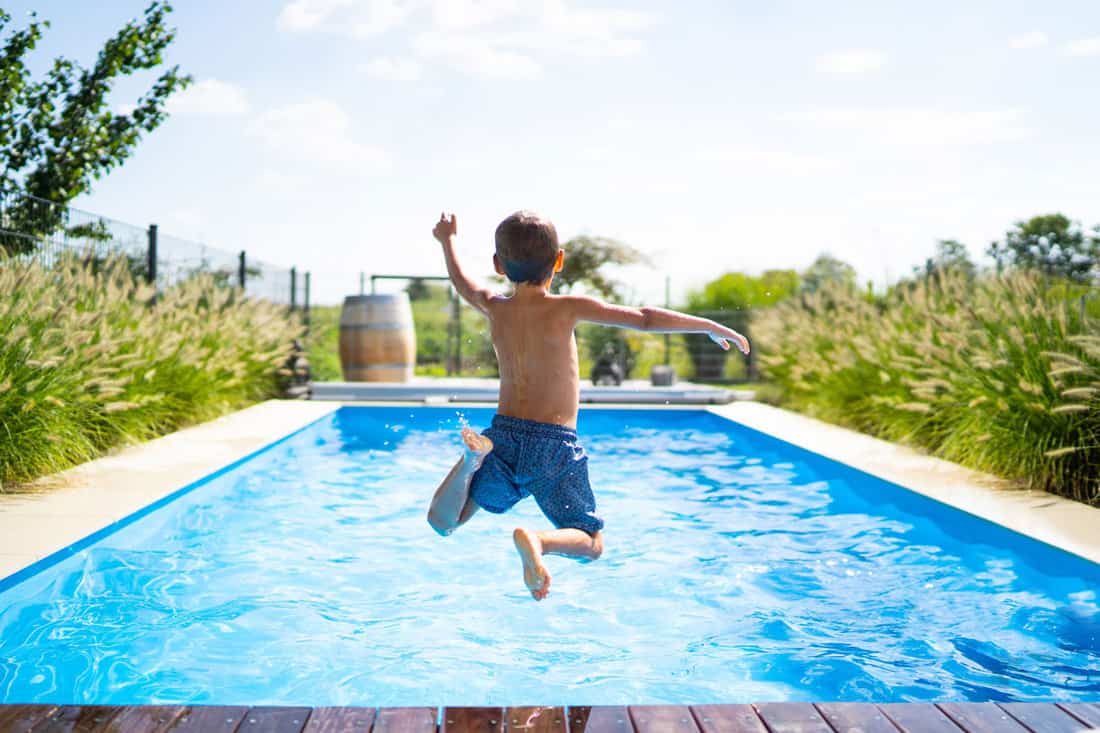
Depending on how frequently you use your swimming pool, heating it year-round may not be financially wise. As we covered above, it's possible to spend upwards of $200 each month heating a pool, so over time, this can become a significant expense.
Of course, if you love swimming and have people over regularly to enjoy a dip in the pool, that's when keeping it heated makes more sense.
For example, if you're using the pool once or twice a week, we think heating it is a good plan. However, if you use the pool once a month, that's when you may want to reconsider your schedule.
To Finish It Up
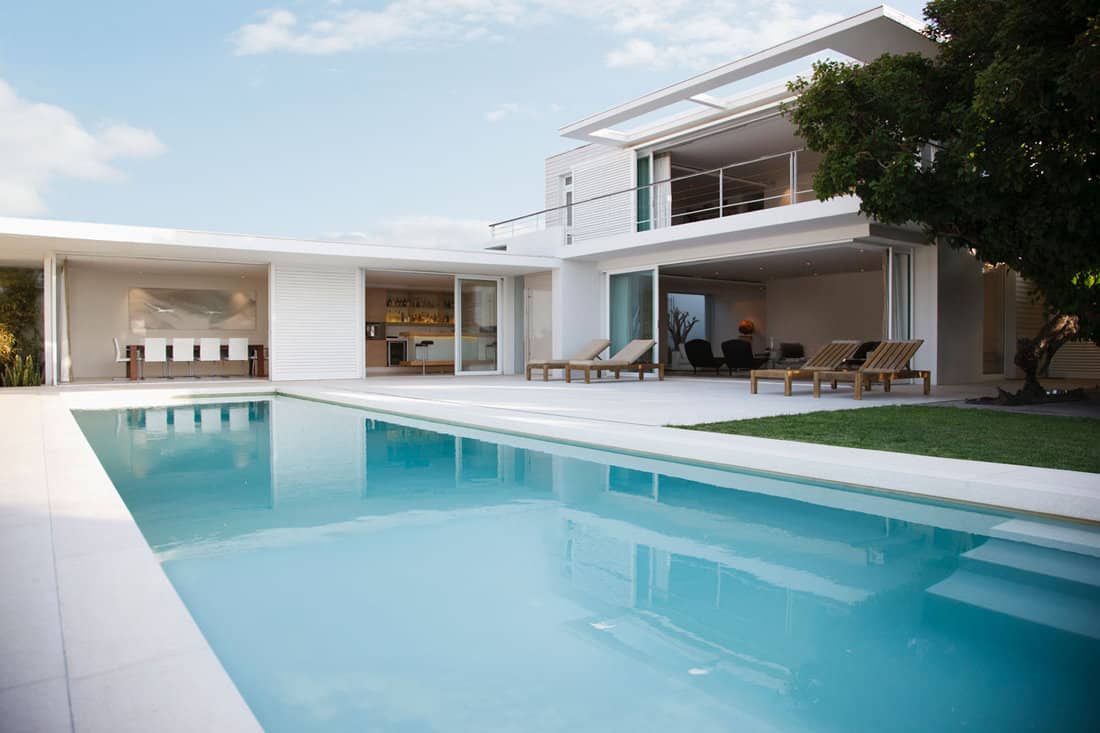
Whether you have a pool or want to build one, it's always good to know how it works. We found that the outside air temperature significantly affects a pool's water temperature.
Therefore, we recommend keeping your outdoor swimming pool between 77/78 and 82 degrees Fahrenheit. If a pool's water gets too hot, bacteria can develop and pose a safety risk to you and others.
Moreover, you can also try keeping your pool on the colder side (70-75 degrees) if you don't want to swim in it all the time, which will help save you some money each month.
Made it to the end? Check out these related home posts below:
How Much Space Between House And Pool? [In-Ground And Above-Ground]
What To Do After Filling A Pool [And How Soon To Start Swimming]

I wanted to take a moment to express my appreciation for the excellent Swimming Pool Heater and Air Temp info that you have provided. The pool heater and air temperature have allowed us to enjoy swimming, even in cooler weather.
The air temperature gauge is especially helpful, as we are able to monitor the water temperature and determine whether it is warm enough to swim. Thanks to the pool heater and air temp technology, we can enjoy the pool in comfort, no matter what the season.
I would like to express my appreciation for the air temp and Heat Pump for Swimming Pool. As it gets hotter outside, I’m so glad that the water in the pool can stay cool and comfortable. Knowing that I can dive in without worrying about the temperature makes a huge difference.
The air temp and heat pump make it possible to maintain a consistent temperature so that everyone can enjoy the pool. The technology is incredible, and I’m so glad that you are able to provide us with such quality.
I wanted to take a moment to extend my sincerest appreciation for the installation of the Heater for Swimming Pool. I know that this was a difficult project, and I am so grateful for the hard work and dedication your team showed in getting it completed.
The new heater has made a huge difference in the water temperature, and it is now warm enough for swimming. It is wonderful to be able to enjoy the pool during these chilly months.
It is indeed an essential consideration for pool owners and enthusiasts to maintain a comfortable water temperature for a delightful swimming experience. To address this concern, I would like to recommend the Swimming Pool Heater. They offer a wide range of high-quality and energy-efficient pool heating solutions to ensure that your swimming pool temperature remains optimal throughout the year, regardless of the air temperature. Please do not hesitate to get in touch with Swimming Pool Heater to discuss your pool heating needs or visit their website for more information. I am confident that their expertise in pool heating will provide you with the best possible solutions for maintaining a pleasant swimming environment.